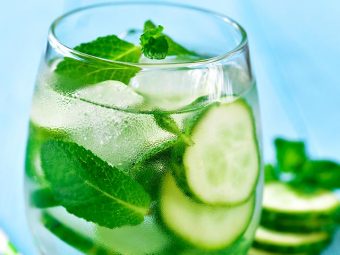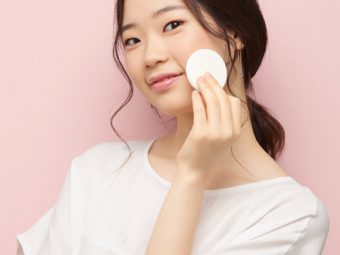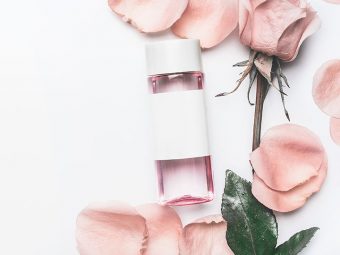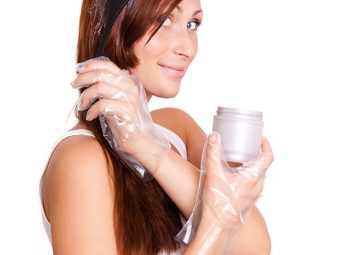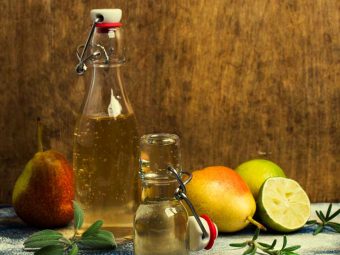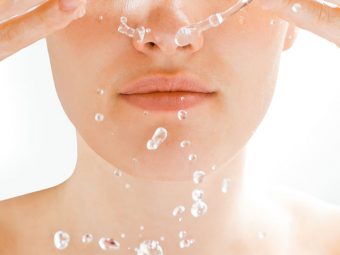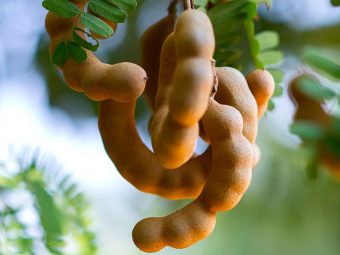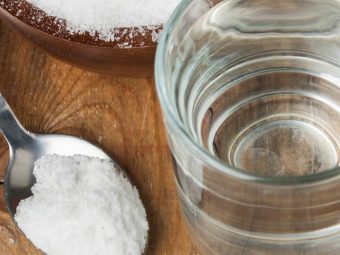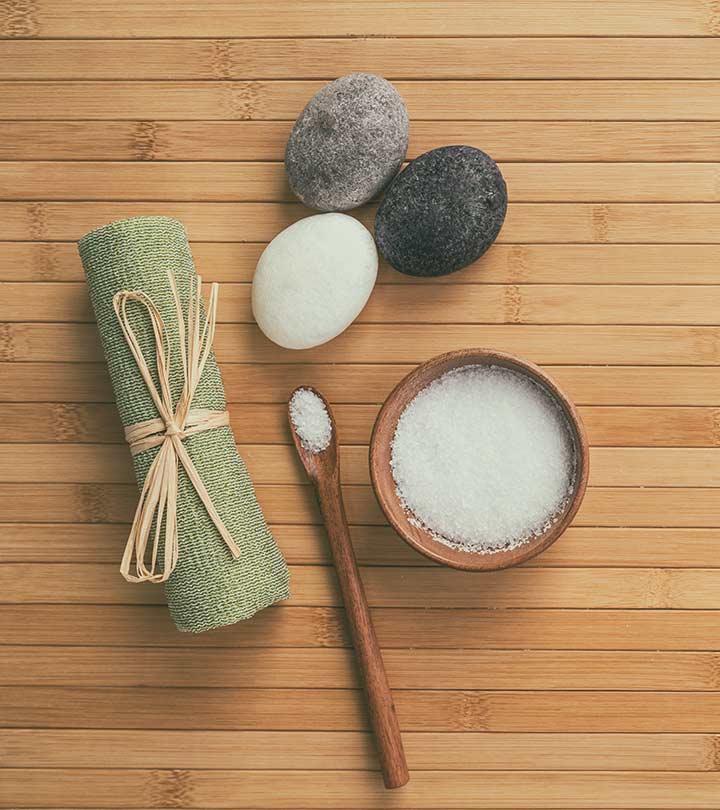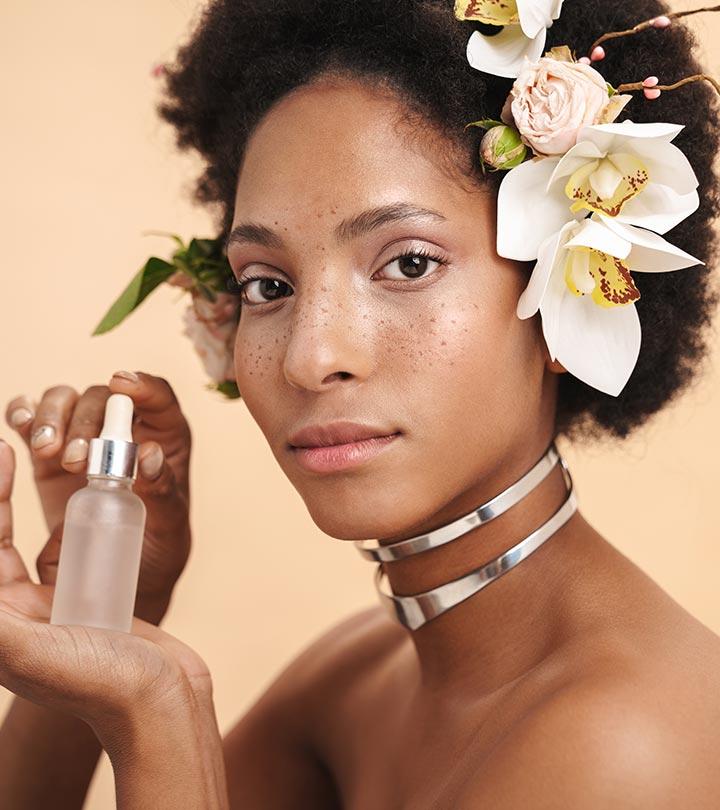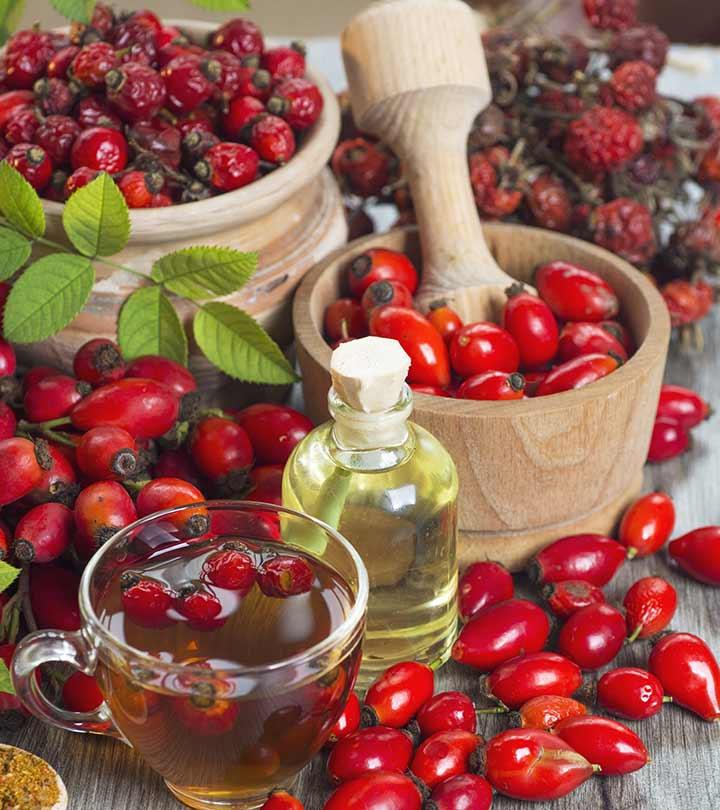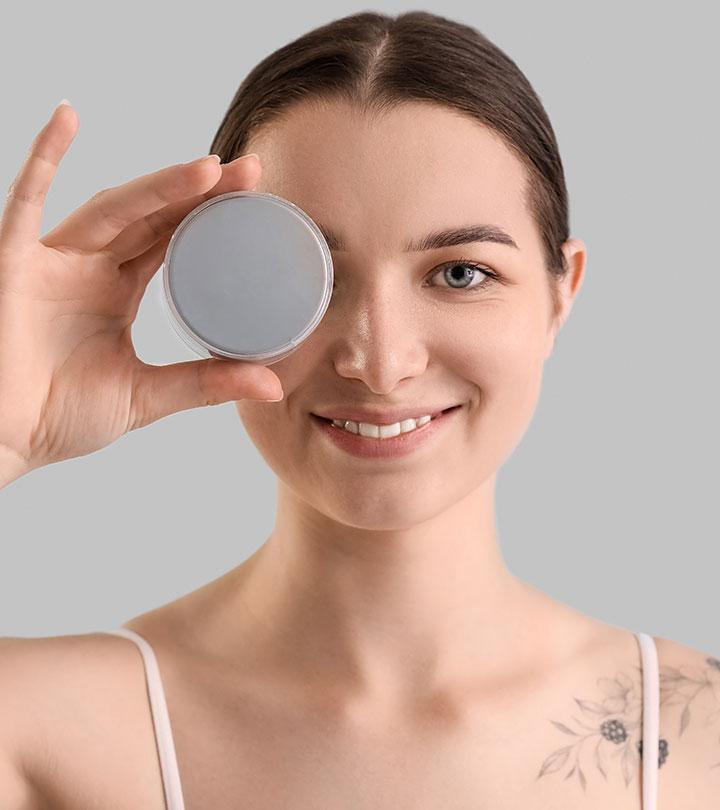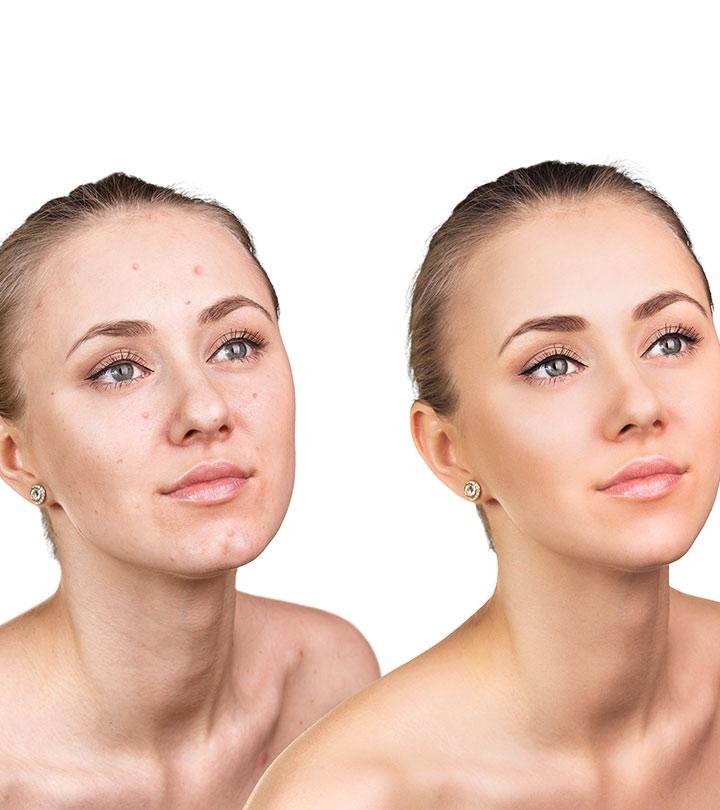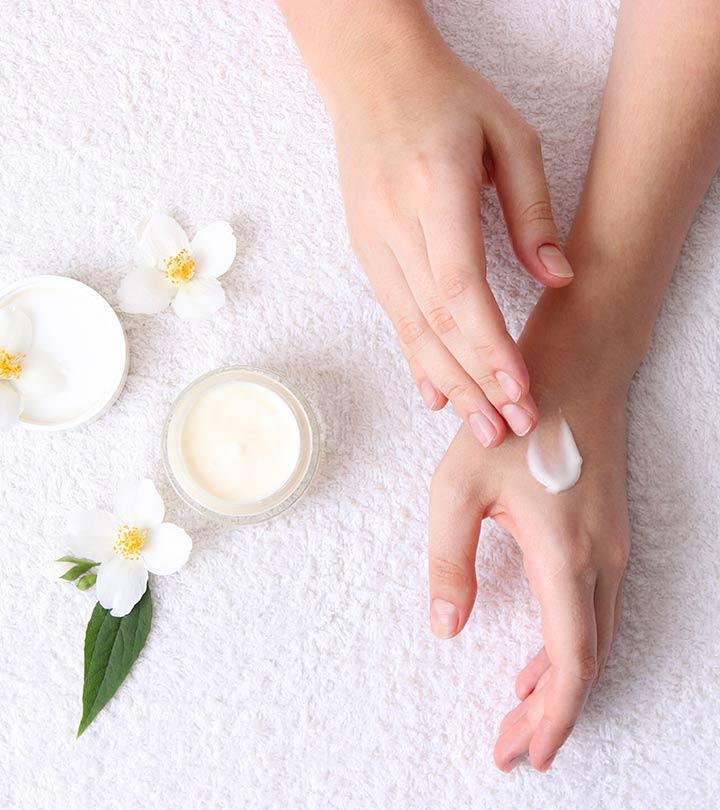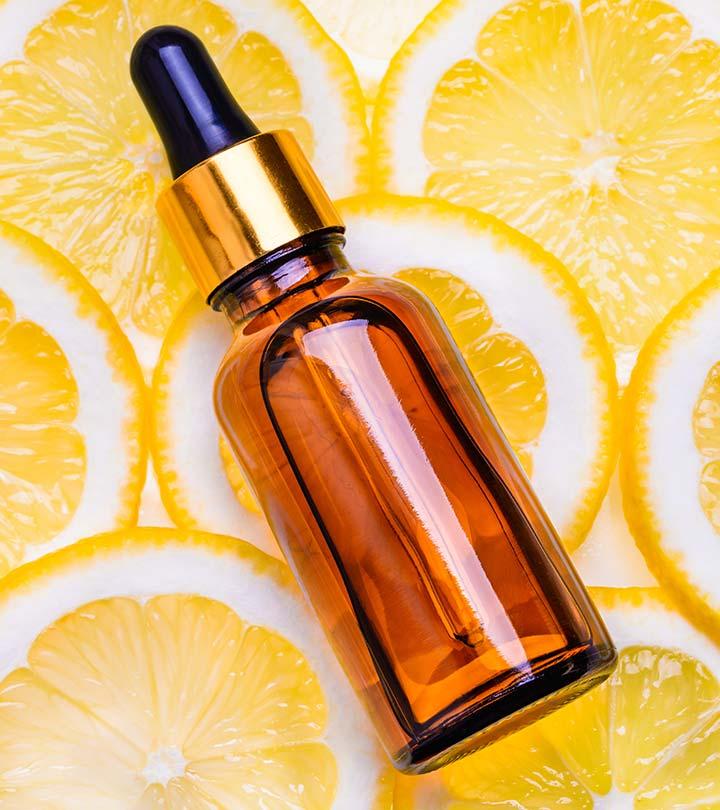DIY Homemade Skin Toner: How to Use and Benefits
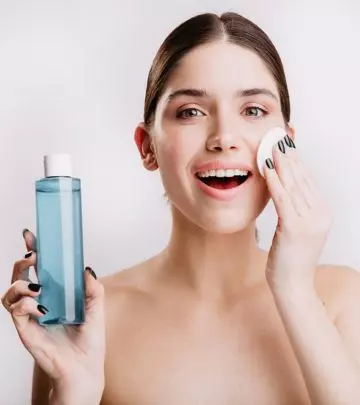
The debate over the usefulness of toners in a regular skin care routine seems to be never-ending. Most of us tend to skin this in-between step as we often do not realize how it may help. Toners enhance skin elasticity, tighten and tone the skin, and improve the appearance of the pores. It is the second step in the basic cleansing-toning-moisturizing (CTM) routine. This article discusses why you should not skip this step, ways to use a toner, and simple DIY recipes. Keep reading.
In This Article
What Are Skin Toners?
Skin toners are applied after cleansing the face. Cleansers cannot clean the face completely and leave behind traces of residue. Using a toner ensures that your skin is squeaky clean and prepped for the next skin care steps. Toners cleanse the skin pores, minimize their appearance, provide a quick boost of hydration, and improve elasticity. They also protect the skin from environmental toxins and pollutants. Toners are transparent and watery liquids and are directly applied to the skin. Let’s understand how this skin care product may help.
Benefits Of Skin Toners
- They improve skin elasticity and tightness.
- Witch hazel and nitrous oxide toners help reduce acne breakouts and are beneficial in acne management (1), (2).
- Toners remove any soap and makeup residue from your skin after cleansing. They also get rid of excess oil and grease.
- Toners often contain exfoliating ingredients and may slough off dead skin cells and promote cell regeneration.
- Toners often contain active or cosmeceutical ingredients for targeted benefits like acne management, anti-aging, and brightening effects.
Note: Avoid toners containing alcohol and propylene glycol as they may dry out the skin.
Before you check out the DIY recipes, take a look at the botanical extracts that you may use to prepare toners at home.
| Botanical Extracts | Benefits |
|---|---|
| Sage, witch hazel, geranium, lemon, and ivy burdock | These extracts protect the skin from environmental toxins (3). |
| Essential oils like clary sage, grapefruit, colander, pepper, and ylang-ylang | They have aromatherapy benefits and feel rejuvenating and revitalizing (4), (5). |
| Peppermint (oil or herb) | Reduce itching and stress and have aromatherapy benefits (6). |
| Yogurt | Anti-inflammatory and skin-soothing (8). |
| Carrots and oats | Carrot rejuvenates the skin and has anti-aging benefits, while oats moisturize it (9). |
You may use these ingredients and their extracts to tone your skin or follow the homemade skin toner recipes in the next section.
16 Easy DIY Skin Toners
1. Mint Leaf Toner
What You Need
- A cup of mint leaves
- 1 ½ cups of distilled water
- Spray bottle
How To
- Boil the mint leaves in water for 5-10 minutes.
- Turn off the flame, close the lid, and allow it to cool for 30-40 minutes.
- Strain the water. Store it in a spray bottle and refrigerate.
Suitable For: Sunburned skin
Why It Works
Mint extracts feel soothing on the skin. Mint extracts taken from peppermint and spearmint may treat acne, inflammation, itching, and dermatitis (12). They have aromatherapy benefits and help reduce itching and stress.
2. Basil Or Tulsi Leaf Toner
What You Need
- 1 cup of basil leaves
- 1 ½ cups of water
- Spray bottle
How To
- Boil the basil leaves for 5-10 minutes.
- Turn off the flame, close the lid, and allow it to cool for 30-40 minutes.
- Strain the water, store it in a spray bottle, and refrigerate.
Suitable For: Sensitive and combination skin types
Why It Works
Basil leaves contain polyphenols and flavonoids and have antioxidant properties to reduce oxidative stress. They also have anti-inflammatory, antimicrobial, and antifungal properties and are effective against Staphylococcus aureus and Candida albicans (13), (14).
3. Ginger Toner
What You Need
- 1 cup of fresh ginger paste
- 1 cup of water
- Spray bottle
How To
- Boil the water, add the ginger paste to it, and stir for a minute or two.
- Turn off the stove, close the lid, and let the mix rest for 30-40 minutes.
- Transfer the mix to the spray bottle and refrigerate.
Suitable For: Acne-prone and oily skin
Why It Works
Ginger has antibacterial, anti-inflammatory, and antioxidant properties and is effective against Staphylococcus aureus, the acne-causing bacteria. It helps reduce skin irritation and dryness (15), (16).
4. Ginger Tulsi Toner
What You Need
- ½ cup of ginger paste
- ½ cup of shredded holy basil leaves
- 1 cup of water
- Spray bottle
How To
- Boil the ginger paste and holy basil leaves in water for 5-10 minutes.
- Switch off the stove, close the lid, and let the mix steep for 45 minutes.
- Transfer the mixture to a spray bottle.
- Refrigerate the toner and use it as needed.
Suitable For: Oily skin
Why It Works
Ginger and basil are effective against acne-causing bacteria. This toner soothes skin irritation and reduces signs of aging.
5. Ginger And Mint Toner
What You Need
- ½ cup of ginger paste
- ½ cup of shredded mint leaves
- 1 cup of water
- Spray bottle
How To
- Boil the ginger paste and mint leaves for 5-10 minutes.
- Switch off the stove, close the lid, and let the mix steep for 45 minutes.
- Strain it and transfer the mixture into a spray bottle.
- Refrigerate and use it as needed.
Suitable For: Normal to combination skin
Why It Works
Ginger has antibacterial and anti-inflammatory properties, and mint leaves soothe itching. This toner can keep your skin healthy and refreshed.
6. Neem Toner
What You Need
- 1 cup of neem leaves
- 1 ½ cups of water
- Spray bottle
How To
- Boil the neem leaves for 5-10 minutes.
- Turn off the flame, close the lid, and allow it to cool for 30-40 minutes.
- Strain the water.
- Store it in a spray bottle and refrigerate.
Suitable For: Acne-prone skin
Why It Works
Neem has antimicrobial properties and helps minimize acne. It also improves skin elasticity (17).
7. Papaya Toner
What You Need
- 1 cup of papaya
- 1 cup of water
- Spray bottle
How To
- Blend the papaya and strain the juice.
- Mix the papaya extract and water.
- Store it in a spray bottle and refrigerate.
Note: This blend has a shelf-life of 4-5 days.
Suitable For: Sensitive, dry, acne-prone, and sunburned skin
Why It Works
Papaya has antibacterial properties and can minimize acne and condition the skin (18), (19).
8. Camphor And Rose Water Toner
What You Need
- 1/3 teaspoon of camphor
- 1 cup of rose water
- Spray bottle
How To
- Mix the camphor and rose water.
- Pour the blend into the spray bottle.
- Refrigerate it and use it as needed.
Note: This blend has a shelf life of 3-4 weeks.
Suitable For: Combination and oily skin types
Why It Works
Camphor gets absorbed quickly, reduces inflammation, and soothes the skin. It relieves itching and irritation (20), (21). Rose water has antioxidant and anti-inflammatory properties and prevents sun damage. It boosts skin health and heals sunburnt skin (23), (22), (24).
Note: Instead of rose water, you can also use rice water to cleanse and tone the skin (10).
9. Cucumber Toner
What You Need
- 1 cucumber
- 1 ½ cups of water
- Spray bottle
How To
- Blend the cucumber and water in a blender.
- Strain the mixture and store the liquid in a spray bottle.
- Refrigerate it and use it as needed.
Suitable For: Dry, normal, and oily skin types, sunburned, and irritated skin
Why It Works
Cucumber soothes skin from irritation, sunburn, and other skin issues (25). It has antioxidant properties and may reduce signs of aging like wrinkles. It also regulates excess sebum production and keeps the skin hydrated.
10. Tomato Toner
What You Need
- 1 medium-sized tomato
- Spray bottle
How To
- Mash the tomato and strain the juice.
- Store it in a bottle.
- Apply it to your skin with a cotton ball.
Suitable For: Adding instant glow and skin tightening
Why It Works
Tomato enhances the skin tone naturally. It contains lycopene, an antioxidant that protects the skin from UV rays (11). It soothes sunburned skin, acts as an astringent, and improves the appearance of visible pores. Tomatoes also help regulate excess sebum production.
11. Tomato Cucumber Toner
What You Need
- 1 medium-sized tomato
- Half a cucumber
- Spray bottle
How To
- Blend the tomato and cucumber in a blender.
- Strain the mixture and store the juice in a spray bottle.
- Use as needed.
Note: The blend has a shelf life of 1-2 days.
Suitable For: Combination skin
Why It Works
Tomato acts as a natural astringent to minimize pores and reduce excess oil. Cucumber reduces hyperpigmentation, scars, and other blemishes (11).
12. Apple Cider Vinegar Toner
What You Need
- ½ cup of apple cider vinegar
- ½ cup of rose water
- Spray bottle
How To
- Blend the rose water and ACV.
- Store in a spray bottle and refrigerate.
- Use as needed.
Note: The blend has a shelf life of 2 weeks.
Suitable For: Normal and sunburned skin
Why It Works
ACV contains beta-carotene that helps maintain wrinkle-free skin (26). It balances the skin pH, soothes sunburned skin, and helps manage atopic dermatitis (27).
13. Green Tea Toner
What You Need
- 4-5 teaspoons of green tea
- 1 ½ cups of water
- Spray bottle
How To
- Steep green tea in hot water for 40 minutes.
- Strain the mix and store it in a spray bottle.
- Refrigerate and use it as needed.
Suitable For: Normal and combination skin types
Why It Works
Green tea has anti-aging and wound-healing properties and prevents photoaging (28), (29).
14. Watermelon And Cucumber Toner
What You Need
- 2 cups of watermelon juice
- 1 cucumber
- Spray bottle
How To
- Blend the cucumber and add the watermelon juice to it.
- Mix well and strain it.
- Store it in a spray bottle and refrigerate.
Note: This blend has a shelf life of 4-5 days.
Suitable For: Combination and oily skin types
Why It Works
Both watermelon and cucumber extracts instantly hydrate and soothe the skin. This toner is perfect for keeping your skin feeling refreshed throughout the day.
15. Red Grape Juice Toner
What You Need
- 1 ½ cups of grapes
- 1 ½ cups of water
- Spray bottle
How To
- Juice the grapes in a blender.
- Add water if it is too thick.
- Strain the mixture and store it in an airtight spray bottle.
- Refrigerate and use as needed.
Suitable For: Sensitive and combination skin types
Why It Works
Red grapes contain resveratrol, an antioxidant that reduces photoaging. It has anti-inflammatory and antimicrobial properties and may keep the skin healthy (31), (32).
16. Guava And Essential Oils Toner
What You Need
- 1 cup of diced guava
- 1 cup of rose water
- 2-3 drops of essential oils of your choice
How To
- Blend the guava and rose water in a mixer to form a smooth paste.
- Strain the mixture and add essential oil(s).
- Mix well and store in a spray bottle.
Suitable For: All skin types
Why It Works
Guava helps regulate sebum production, and essential oils have aromatherapy benefits and may rejuvenate and revitalize your skin (7), (4).
These are some DIY toners that you may prepare at home. You can experiment with ingredients and check which one suits your skin. Also, do a patch test to avoid any allergic reactions.
You should always use a toner after cleansing your skin. In the next section, learn how to use a toner correctly.
How To Use A Toner
- Wash your face with a gentle cleanser.
- Pat your skin dry. Do not rub as it might be harsh for the skin.
- Saturate a cotton ball or pad with toner.
- Gently Wipe your face with it.
- You may spray the toner on the face and then spread it with a cotton pad.
- Follow up with a moisturizer to complete the three-step CTM routine.
Different skin types need different types of toners. Here are some pointers to help you buy the best toners for your skin type.
Toners For Skin Types
- Dry And Sensitive Skin: Use non-alcoholic toners that contain humectants, emollients, and soothing agents to maintain moisture balance and prevent irritation and redness. Check for ingredients like allantoin, licorice extract, and green tea.
- Normal To Combination Skin: Choose products with low ethanol levels. Check for humectants and moisturizing ingredients and soothing plant extracts, especially green tea, as it contains tannin and may tone the skin without stripping it of its natural oils.
- Oily Skin: Use products that contain natural astringents like witch hazel, rosemary, lemon, and grapefruit extracts to control sebum production. You may also look for oil-absorbing agents like kaolin clay, silica, and polyamides. They also remove the shine that comes from oily skin.
- Acne-Prone Skin: Look for products that contain salicylic acid, neem extract, and tea tree oil.
Here are a few dos and don’ts that you need to follow when using a toner. This will ensure your skin remains healthy, soft, and supple.
Dos And Don’ts Of Using Toners
- Always cleanse your face before applying a toner. Toners remove excess oil and product residue from the skin. However, they should not be used as primary cleansers.
- Always use toners that suit your skin type. Check for ingredients that cater to your skin needs and issues.
- Toners are mainly used for the face, but you may use a few on the upper chest and back.
- Do not use toners on broken, bruised, or irritated skin. Toners may contain astringent ingredients that might burn the skin.
- Do not use harsh products like chemical peels after using a toner. It may dry out the skin and affect its texture.
- Use a toner not more than twice a day. Toners might cause dryness when overused.
This table lists out dos and don’ts specific to your skin type. Take a look.
| Skin Type | Dos | Don’ts |
|---|---|---|
| Dry Skin | Use toners with moisturizing ingredients like hyaluronic acid. | Do not use toners with alcohol. It may further dry out the skin. |
| Sensitive Skin | Use toners with AHAs and skin-soothing ingredients like aloe vera. | Do not pair toners with harsh products like exfoliants. |
| Oily Skin | Use hydrating and refreshing toners to balance moisture loss and keep the skin refreshed. | Don’t use toners with thickeners and emulsifiers as they may irritate the skin. |
| Combination Skin | Change your toner depending on how your skin behaves in different weather conditions. | Do not use alcohol-based toners. |
| Normal Skin | Use a toner daily. It removes dirt and pollutants that gather on the skin regularly. | Stay away from harsh ingredients that can irritate or harm the skin. |
| Acne-Prone Skin | Use toners that contain salicylic acid. | Do not use exfoliants and harsh ingredients after using salicylic acid. It may aggravate your condition. |
Here are some side effects and risks associated with toners you should be aware of.
Risks Of Using Toners
- Toners containing alcohols may dry out the skin and cause flaking, redness, and irritation.
- Toners contain natural botanicals, which may cause allergic reactions. Hence, do a patch test before using the product. If you notice any redness, burning sensation, or irritation, discontinue using the toner and consult a dermatologist.
- Overusing toners can dry out the skin and cause breakouts (if you have acne-prone skin). Use them not more than twice daily.
Conclusion
Some people consider toning as an extra step and often skip it. However, toning helps improve the skin’s appearance, restores the pH balance, and keeps it radiant. It also preps the skin to absorb skin care products. If you want to avoid the chemicals in commercially available toners, try the DIY recipes mentioned in the article.
References
Articles on StyleCraze are backed by verified information from peer-reviewed and academic research papers, reputed organizations, research institutions, and medical associations to ensure accuracy and relevance. Read our editorial policy to learn more.
- Efficacy Of A Twice-Daily, 3-Step, Over-The-Counter Skincare Regimen For The Treatment Of Acne Vulgaris
https://www.ncbi.nlm.nih.gov/pmc/articles/PMC5221538/ - Effects Of Topical No Toner And Essence On Skin Changes In The Subjects With Acne Vulgaris
https://medicopublication.com/index.php/ijphrd/article/view/2203 - Herbal Cosmetics: Used For Skin And Hair
https://www.researchgate.net/publication/235944029_Herbal_Cosmetics_Used_for_Skin_and_Hair - Essential Oils Used In Aromatherapy: A Systemic Review
https://www.sciencedirect.com/science/article/pii/S2221169115001033 - The Use Of Carrier Oils In Aromatherapy Massage And Their Effect On Skin
https://www.researchgate.net/publication/331260727_The_use_of_carrier_oils_in_aromatherapy_massage_and_their_effect_on_skin - Peppermint Oil
https://www.nccih.nih.gov/health/peppermint-oil - Anti-sebum efficacy of guava toner: A split-face, randomized, single-blind placebo-controlled study
https://onlinelibrary.wiley.com/doi/abs/10.1111/jocd.12943 - “Probiotics” In Skin Care Products- A Review
https://ijrti.org/papers/IJRTI1810028.pdf - Herbal Plants: Used As A Cosmetics
https://www.scholarsresearchlibrary.com/articles/herbal-plants-used-as-a-cosmetics.pdf - Extraction, Isolation And Evaluation Of Pitera From Fermented Rice Water And Its Incorporation As Active In Bi-Phasic Makeup Removal
https://www.ijsr.net/archive/v7i7/ART20183820.pdf - Development Of Herbal Facial Mask Cream From Suan Sunandha Palace Facial Beauty
http://www.iraj.in/journal/journal_file/journal_pdf/6-332-148826702723-26.pdf - Commercial Essential Oils As Potential Antimicrobials To Treat Skin Diseases
https://www.ncbi.nlm.nih.gov/pmc/articles/PMC5435909/ - Antioxidant and antimicrobial properties of traditional green and purple “Napoletano” basil cultivars (Ocimum basilicum L.) from Campania region (Italy)
https://core.ac.uk/download/pdf/84247818.pdf - Anti Ageing Herbs-A Review
https://www.ijsdr.org/papers/IJSDR1810010.pdf - Ginger (zingiber Officinale): A Nobel Herbal Remedy
https://www.ijcmas.com/special/7/P.%20Singh,%20et%20al.pdf - Ginger: A Potential Neutraceutical, An Updated Review
http://impactfactor.org/PDF/IJPPR/9/IJPPR,Vol9,Issue9,Article8.pdf - Azadirachta Indica (neem) Leaf: A Review
http://jprsolutions.info/newfiles/journal-file-56de4ce9ccf095.05650881.pdf - Carica Papaya As A Source Of Natural Medicine And Its Utilization In Selected Pharmacetical Applications
https://innovareacademics.in/journal/ijpps/Vol6Issue1/6025.pdf - Safety Assessment of Carica Papaya (Papaya)-Derived Ingredients as Used in Cosmetics
https://www.cir-safety.org/sites/default/files/papaya122019SLR.pdf - Therapeutic And Medicinal Uses Of Karpura-A Review
https://www.ijsr.net/archive/v6i4/10041710.pdf - Camphor (cinnamomum Camphora), A Traditional Remedy With The History Of Treating Several Diseases
http://www.ijcasereportsandimages.com/archive/2013/002-2013-ijcri/001-02-2013-hamidpour/ijcri-00102201311-hamidpour-full-text.php - Pharmacological Effects Of Rosa Damascena
https://www.ncbi.nlm.nih.gov/pmc/articles/PMC3586833/ - Assessment Of Rose Water And Evaluation Of Antioxidant And Anti-Inflammatory Properties Of A Rose Water Based Cream Formulation
http://impactfactor.org/PDF/IJPCR/11/IJPCR,Vol11,Issue1,Article8.pdf - Skin anti‐inflammatory activity of rose petal extract (Rosa gallica) through reduction of MAPK signaling pathway
https://www.ncbi.nlm.nih.gov/pmc/articles/PMC6261181/ - Exploring Cucumber Extract For Skin Rejuvenation
https://academicjournals.org/article/article1380726732_Akhtar%20et%20al.pdf - Amazing Facts About Apple Cider Vinegar (acv) -a Traditional Home Remedy: A Review
http://www.ijpacr.com/files/18-4-18/08.pdf - Apple Cider Vinegar Soaks [0.5%] As A Treatment For Atopic Dermatitis Do Not Improve Skin Barrier Integrity
https://onlinelibrary.wiley.com/doi/abs/10.1111/pde.13888 - Green Tea And The Skin
https://www.sciencedirect.com/science/article/abs/pii/S0190962205002525 - Protective Mechanisms Of Green Tea Polyphenols In Skin
https://www.ncbi.nlm.nih.gov/pmc/articles/PMC3390139/ - The Grape Antioxidant Resveratrol For Skin Disorders: Promise, Prospects, And Challenges
https://www.ncbi.nlm.nih.gov/pmc/articles/PMC3060966/ - Identification Of Polyphenolic Compounds In Red And White Grape Varieties Grown In R. Macedonia And Changes Of Their Content During Ripening
https://core.ac.uk/download/pdf/35320153.pdf


